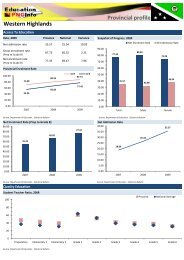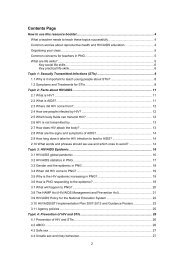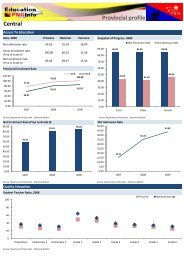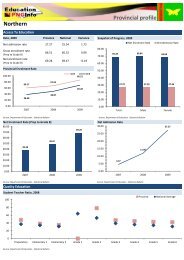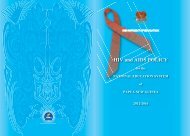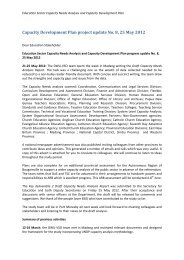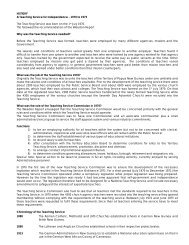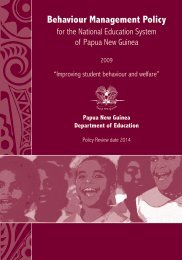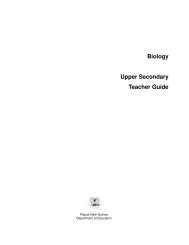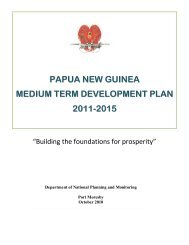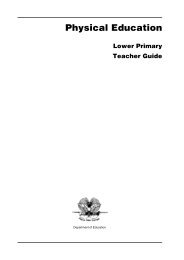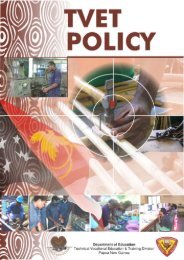Health Education to Prevent HIV/AIDS & STIs - Department of ...
Health Education to Prevent HIV/AIDS & STIs - Department of ...
Health Education to Prevent HIV/AIDS & STIs - Department of ...
You also want an ePaper? Increase the reach of your titles
YUMPU automatically turns print PDFs into web optimized ePapers that Google loves.
<strong>Department</strong> <strong>of</strong> <strong>Education</strong> TVET Division<br />
<strong>HIV</strong>/<strong>AIDS</strong> & STI Teacher Guide<br />
• Forced sex (partner is not ready)<br />
• Vaginal sex without a condom<br />
• Anal sex with a condom<br />
• Sex for money/food<br />
• Being faithful <strong>to</strong> your partner<br />
• Sex within a cult<br />
• Sex with a condom when one <strong>of</strong> the couple has an STI<br />
• Polygamy<br />
• Unprotected sex during a woman’s period (menstruation)<br />
• Unprotected sex if you or your partner has an STI<br />
• Withdrawal (sex without a condom when the man pulls out and ejaculates<br />
outside the woman)<br />
The correct answers (for the risk <strong>of</strong> contracting <strong>HIV</strong> from a partner who is infected<br />
with <strong>HIV</strong>). They can use the Resource Book for this.<br />
No risk <strong>of</strong> <strong>HIV</strong> transmission<br />
Abstaining from sex; Masturbating yourself; Kissing; Deep kissing (kissing with<br />
<strong>to</strong>ngues) Masturbation by someone else (rubbing or stroking the penis, cli<strong>to</strong>ris or<br />
vagina)<br />
Low risk <strong>of</strong> <strong>HIV</strong> transmission<br />
Oral sex (sucking or licking the penis, vagina or cli<strong>to</strong>ris); Vaginal sex using a condom<br />
correctly every time you have sex; Anal sex with a condom (slightly more risky than<br />
vaginal sex with a condom)<br />
High risk <strong>of</strong> <strong>HIV</strong> transmission<br />
Vaginal sex without a condom; Having sex <strong>to</strong>o young; Polygamy; Multiple sexual<br />
partners; Unprotected sex during a woman’s period; Withdrawal<br />
Very high risk <strong>of</strong> <strong>HIV</strong> transmission<br />
Anal sex without a condom; Sex when you are drunk or on drugs; Rape/gang rape;<br />
Sex for money/food; Sex within a cult (usually risky sex); Sexual abuse; Unprotected<br />
sex if you or your partner has an STI<br />
Don’t know<br />
Being faithful (your partner may not be faithful <strong>to</strong> you so you need <strong>to</strong> both be tested<br />
and both be faithful for this <strong>to</strong> be effective)<br />
Ask the students if there are any missing (e.g. sex before marriage, sex during<br />
adolescence, child abuse, having an older husband, having an unfaithful partner).<br />
Place these on the scale.<br />
Remind students that values play an important part in this. Some Churches may<br />
oppose condoms and masturbation. Some cultures allow multiple wives. Some<br />
behaviours are illegal. We are looking at the relative risks <strong>of</strong> <strong>HIV</strong> infection. Many<br />
people do not do some <strong>of</strong> these sexual practices.<br />
Remind them that risk depends on the possible harm. E.g. it is unlikely that anal sex<br />
would lead <strong>to</strong> pregnancy but it might cause pain and bleeding and a high risk<br />
contracting <strong>STIs</strong> or <strong>HIV</strong>.<br />
51





